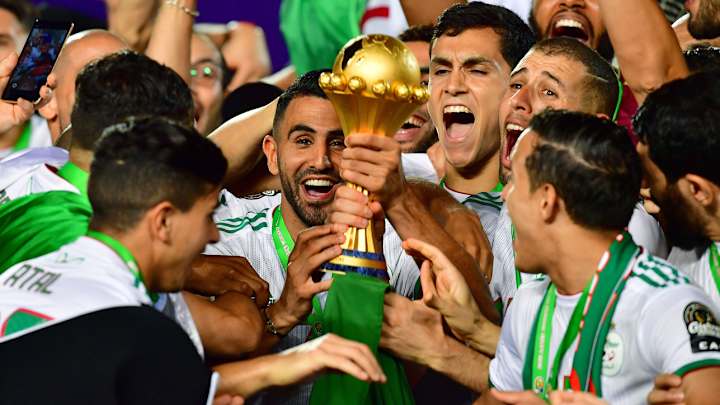Algeria's Deserved Title Caps Africa Cup of Nations Clouded By CAF's Woes

CAIRO – In the end, there were extraordinary scenes of celebration, as Algeria’s players raced behind the goal at the south end of the Cairo International Stadium and thousands of their fans rushed to the fences at the front of those stands. It had been 29 years since Algeria last won the Africa Cup of Nations, and this time the desire for victory was perhaps greater than ever before as players sought to honor the spirit of the Hirak, the pro-democracy protests that broke out in February and toppled the president two months later.
And yet it didn’t take long for reservations to cut through the jubiliation. After taking the lead through Baghdad Bounedjah’s deflected shot after 79 seconds, Algeria spoiled and scrapped its way to victory, as though unable to believe that it really was–and it was–the best team in the tournament.
More seriously, perhaps, was the fact that hundreds of Algerians with tickets were denied entry, despite there being banks of empty seats in the stadium. Organizationally, the tournament was often shambolic.
On an institutional level, the Confederation of African Football has gone backwards. When, in March 2017, Ahmad Ahmad was elected to end the 29-year reign of Issa Hayatou as president, the assumption was that things couldn’t get any worse. The assumption was wrong. At least Hayatou never got himself arrested in Paris as part of an investigation into corruption on the eve of a Cup of Nations.
This week, at the CAF Congress in the Egyptian capital, FIFA general secretary Fatma Samoura was confirmed as High Commissioner for Africa for an initial six months beginning on August 1, essentially an admission that CAF is no longer capable of governing African football itself. Thursday’s post-Congress press conference with Ahmad was a classic of its kind: of the hour set aside for the media, after a lengthy delay to resolve issues with the simultaneous translation, there were 25 minutes of filibuster, followed by a pointless 15-minute video presentation, leaving time for only five questions, two of which Ahmad didn’t answer and one of which he couldn’t.
Beyond an oblique reference to having “reshuffled my cabinet,” there wasn’t even a formal confirmation that Nigerian Amaju Pinnick had been removed as vice president, let alone an explanation as to why (even if everybody knows). He has been replaced by veteran South African administrator Danny Jordaan, described by a Nigerian journalist as a man who would sell his left shoe to clean his right. This does not feel much like the fresh start Ahmad promised on election.
This was the fourth Cup of Nations in a row that had to be switched to a new venue with relatively late notice, and the smart money is on Cameroon 2021 taking place in Morocco. In some ways, CAF is the victim of political and economic upheaval beyond its control, but this tournament had to be switched from Cameroon less because of tensions between the Anglophone and Francophone parts of the country and more because of the late decision to expand the tournament from 16 to 24 teams, leading to a desperate and ultimately failed attempt to upgrade sufficient additional stadiums.
Whether the change in format was a success is debatable. CAF will point to the achievements of Madagascar and Benin in reaching the quarterfinals for the first time, and the scenes of jubilation in Antananarivo and Cotonou make it impossible to begrudge their success, but the suspicion is that they are good enough sides to have qualified for a 16-team tournament. The truth is that, while there may not be much difference in quality between, say, the ninth and 29th-best teams in Africa, the group stage–36 games to eliminate eight sides–was a drag, with too many matches lacking drama or any sense of jeopardy.
As a stand-in host, Egypt was, with certain major reservations, a success. The pitches were excellent, and the result, in the games that kicked off later in the day and so weren’t slowed by the ferocious temperatures, was some extremely good football. But the problem, a familiar one at Cups of Nations compounded by local issues, was the crowds.
Often at Cups of Nations, the explanation for low attendances is that there is little culture of going to stadiums in the host country: football is something that happens a long way away, in Europe, and so is consumed on television at home or in bars or cafes. That is not the case in Egypt, even if recent tragedies have led to various stadium closures. Here, ticket prices were set high and a labyrinthine and intrusive fan ID system implemented, seemingly with the intention of preventing large gatherings of fans.
Not that any of that will worry Algeria, which, almost despite itself, was a worthy champion. Its coach, Djamel Belmadi, is part of a new wave of coaches who played for African nations but who also have significant European experience. His side was modern, well-drilled and tactically intelligent. Algeria is probably the best champion since Egypt completed its three-peat in 2010. You just hope that if this is the start of a similar period of sustained success, Algeria begins to believe in itself, plays rather more and spoils rather less.

An accomplished author of multiple books, Jonathan Wilson is one of the world’s preeminent minds on soccer tactics and history.